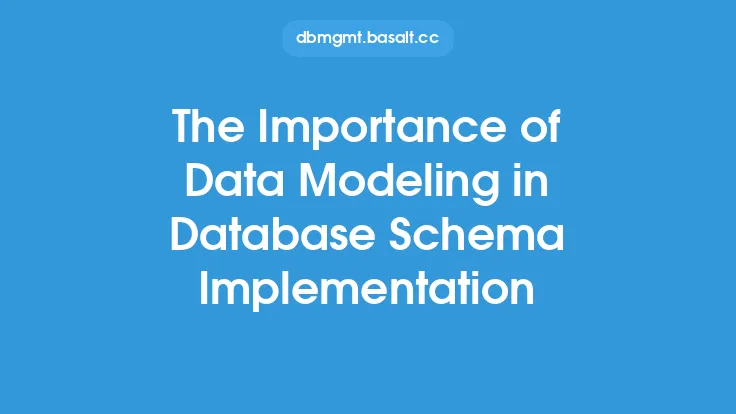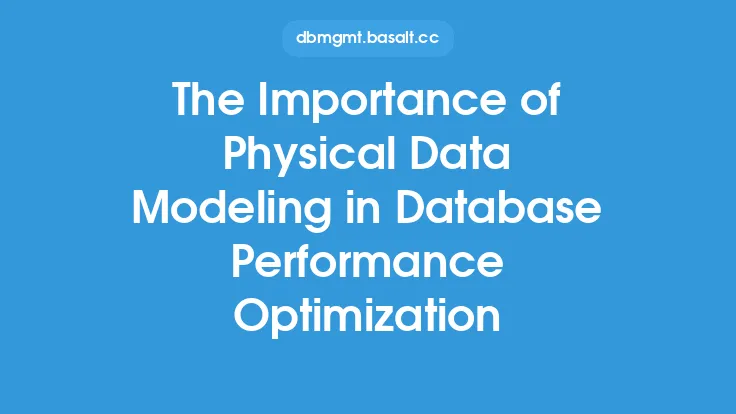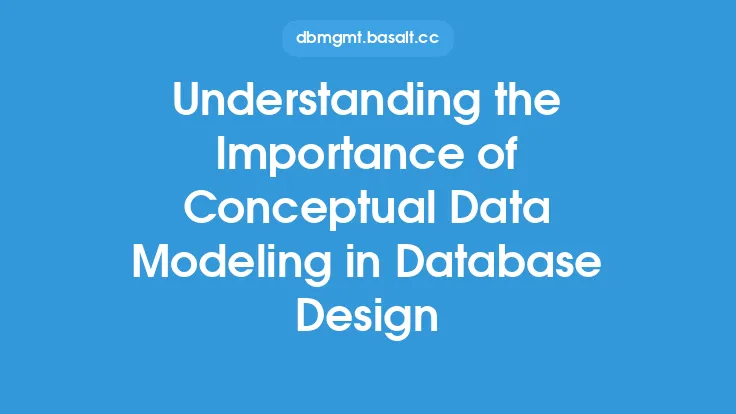Data integrity is a critical aspect of logical data modeling, as it ensures that the data stored in a database is accurate, consistent, and reliable. In logical data modeling, data integrity refers to the correctness and consistency of the data, as well as its adherence to the rules and constraints defined in the data model. The importance of data integrity in logical data modeling cannot be overstated, as it has a direct impact on the quality of the data and the overall performance of the database.
Introduction to Data Integrity
Data integrity is achieved through a combination of data validation, data normalization, and data constraints. Data validation ensures that the data entered into the database is correct and consistent, while data normalization ensures that the data is organized in a way that minimizes data redundancy and improves data integrity. Data constraints, such as primary keys, foreign keys, and check constraints, are used to enforce the rules and relationships defined in the data model.
Types of Data Integrity
There are several types of data integrity, including entity integrity, referential integrity, and domain integrity. Entity integrity ensures that each row in a table is unique and that there are no duplicate rows. Referential integrity ensures that the relationships between tables are maintained, and that any changes to the data in one table do not violate the relationships with other tables. Domain integrity ensures that the data in each column is valid and consistent, and that it conforms to the defined data type and format.
Importance of Data Integrity in Logical Data Modeling
Data integrity is essential in logical data modeling because it ensures that the data is accurate, consistent, and reliable. Without data integrity, the data in the database may be incomplete, inaccurate, or inconsistent, which can lead to errors, inconsistencies, and poor decision-making. Data integrity also ensures that the data is secure and protected from unauthorized access or modification. Additionally, data integrity is critical for maintaining data quality, as it ensures that the data is free from errors and inconsistencies.
Benefits of Data Integrity
The benefits of data integrity in logical data modeling are numerous. Some of the key benefits include improved data quality, increased data consistency, and enhanced data security. Data integrity also improves the performance of the database, as it reduces the risk of data errors and inconsistencies. Additionally, data integrity ensures that the data is reliable and trustworthy, which is critical for making informed business decisions.
Best Practices for Ensuring Data Integrity
To ensure data integrity in logical data modeling, several best practices can be followed. These include defining clear and concise data validation rules, using data normalization techniques to minimize data redundancy, and implementing data constraints to enforce the rules and relationships defined in the data model. Additionally, regular data audits and data quality checks can be performed to identify and correct any data errors or inconsistencies.
Common Data Integrity Issues
Despite the importance of data integrity, several common data integrity issues can arise in logical data modeling. These include data inconsistencies, data redundancies, and data errors. Data inconsistencies can occur when the data in different tables is not consistent, while data redundancies can occur when the same data is stored in multiple tables. Data errors can occur when the data is incorrect or incomplete, which can lead to errors and inconsistencies in the database.
Tools and Techniques for Ensuring Data Integrity
Several tools and techniques can be used to ensure data integrity in logical data modeling. These include data validation tools, data normalization tools, and data constraint tools. Data validation tools can be used to check the data for errors and inconsistencies, while data normalization tools can be used to minimize data redundancy and improve data integrity. Data constraint tools can be used to enforce the rules and relationships defined in the data model.
Conclusion
In conclusion, data integrity is a critical aspect of logical data modeling, as it ensures that the data stored in a database is accurate, consistent, and reliable. By following best practices, using tools and techniques, and avoiding common data integrity issues, data integrity can be ensured, and the quality of the data can be improved. The importance of data integrity in logical data modeling cannot be overstated, as it has a direct impact on the quality of the data and the overall performance of the database.





